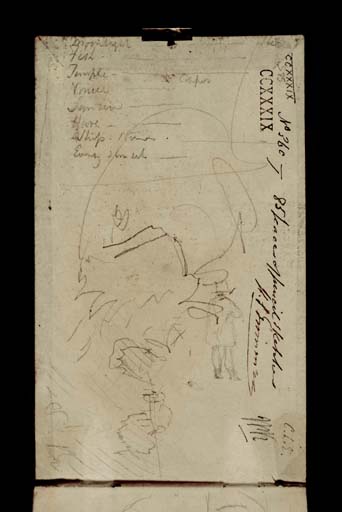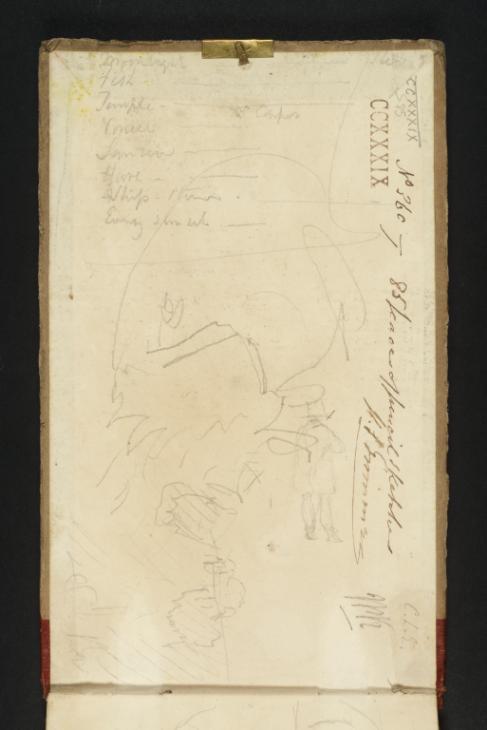Joseph Mallord William Turner ?The Entrance of Peak Cavern, Castleton; ?a Farmer; with Inscription by Turner: ?List of 'Little Liber' Subjects ?1831
Image 1 of 2
-
 Joseph Mallord William Turner, ?The Entrance of Peak Cavern, Castleton; ?a Farmer; with Inscription by Turner: ?List of 'Little Liber' Subjects ?1831 (Inside front cover of sketchbook)Inside front cover of sketchbook
Joseph Mallord William Turner, ?The Entrance of Peak Cavern, Castleton; ?a Farmer; with Inscription by Turner: ?List of 'Little Liber' Subjects ?1831 (Inside front cover of sketchbook)Inside front cover of sketchbook -
 Joseph Mallord William Turner, ?The Entrance of Peak Cavern, Castleton; ?a Farmer; with Inscription by Turner: ?List of 'Little Liber' Subjects ?1831 (Enhanced image)Enhanced image
Joseph Mallord William Turner, ?The Entrance of Peak Cavern, Castleton; ?a Farmer; with Inscription by Turner: ?List of 'Little Liber' Subjects ?1831 (Enhanced image)Enhanced image
Inside front cover of sketchbook
Joseph Mallord William Turner,
?The Entrance of Peak Cavern, Castleton; ?a Farmer; with Inscription by Turner: ?List of 'Little Liber' Subjects
?1831
(Inside front cover of sketchbook)
Joseph Mallord William Turner 1775–1851
Inside Front Cover:
?The Entrance of Peak Cavern, Castleton; ?a Farmer; with Inscription by Turner: ?List of ‘Little Liber’ Subjects ?1831
D41053
Pencil on white wove paper, 191 x 114 mm
Inscribed by Turner in pencil (see main catalogue entry)
Inscribed by later hands in pencil and ink (see main catalogue entry)
Blind-stamped with Turner Bequest monogram centre right
Inscribed in pencil ‘CCXXXIX | [?S]85’ top right, descending vertically
Stamped in black ‘CCXXXIX’ top right, descending vertically
Inscribed by Turner in pencil (see main catalogue entry)
Inscribed by later hands in pencil and ink (see main catalogue entry)
Blind-stamped with Turner Bequest monogram centre right
Inscribed in pencil ‘CCXXXIX | [?S]85’ top right, descending vertically
Stamped in black ‘CCXXXIX’ top right, descending vertically
Accepted by the nation as part of the Turner Bequest 1856
References
1909
A.J. Finberg, A Complete Inventory of the Drawings of the Turner Bequest, London 1909, vol.II, p.733, as ‘inside ... cover, a landscape, a figure of a farmer, and ... list in pencil’, with transcription.
1910
C[harles] Lewis Hind, Turner’s Golden Visions, London and Edinburgh 1910, p.154, with transcription.
1987
John Gage, J.M.W. Turner: ‘A Wonderful Range of Mind’, New Haven and London 1987, p.246 note 8.
2004
Ian Warrell in Katharine Lochnan, Luce Abélès, John House and others, TurnerWhistlerMonet, exhibition catalogue, Art Gallery of Ontario, Toronto 2004, p.83 (under nos.5–7 dating list to c.1830).
Turner’s drawings and inscription here were made with the page turned vertically. The loose drawing towards the top is possibly looking out from the entrance to a Peak District cave, perhaps Peak Cavern at Castleton; compare the 1805 engraving after Edward Dayes (1763–1804) of The Peak Cavern, Derbyshire: View from the Interior of the Great Arch (Tate impression: T06400). For other views of the cave, Castleton and Peveril Castle, see under folio 1 verso (D22152). The orientation and subject of the jagged, hatched shapes towards the bottom left are unclear, but they may also be cave features.
With the page turned vertically, towards the bottom right is a figure which Finberg identified as ‘a farmer’. Seen from the back, he wears a tall, tapering hat, and a short coat or smock. There is a comparatively large study of another apparently rural character on folio 1 verso (D22152); other figure studies in this book include those on folios 4 verso, 5 recto, 61 verso and 64 verso (D22157, D22158, D22264, D22270), and folio 69 verso (D18591; Turner Bequest CCXI 42).
With the page turned vertically, the upper half is taken up with the following list:
Moonlight ______ [...]
Fish _________________
Temple _________________
Copper
Venice ________
Sunrise __________
Hare ____________
Ship – Storm ___________
Evening sunset _____
Fish _________________
Temple _________________
Copper
Venice ________
Sunrise __________
Hare ____________
Ship – Storm ___________
Evening sunset _____
C.L. Hind thought the words suggested a quality of immediacy, as Turner ‘seems to be present, noting nature, ready to record some sudden beauty’.1 However, the subjects appear to be among those of Turner’s so-called ‘Little Liber’, a series of twelve unpublished mezzotint landscape and seascape compositions which mark an experimental step beyond the use of tonal mezzotint over etched outlines of the Liber Studiorum, towards an expression of landscape, weather and light in terms of light and shade alone. For further discussion, see the present author’s ‘Liber Studiorum c.1806–24’ and ‘Little Liber c.1823–6’ sections in the present catalogue. The subjects listed on this page can be related with varying degrees of certainty to ‘Little Liber’ compositions, in what appears to be Turner’s sole written reference to the series:
| Turner’s wording: | Possible ‘Little Liber’ subject: |
| ‘Moonlight’ | Shields Lighthouse or St Michael’s Mount |
| ‘Fish’ | The Medway – Thunderstorm with Rainbow |
| ‘Temple’ | Paestum |
| ‘Venice’ | Catania, Sicily |
| ‘Sunrise’ | Study of Sea and Sky |
| ‘Hare’ | Gloucester Cathedral |
| ‘Ship – Storm’ | Ship in a Storm |
| ‘Evening sunset’ | The Evening Gun |
This table is repeated in the ‘Little Liber’ section Introduction, where the subjects are fully documented and cross-referenced to the standard literature. The present sketchbook is watermarked 1820 but remained largely if not wholly blank until Turner’s travels around the Midlands, so it is possible that the list dates from a considerable time beforehand. John Gage has suggested that Turner’s ‘Sunrise’ and ‘Evening sunset’ relate to the quotation ‘When first the sun with beacon red’, printed under no.319 in the Royal Academy exhibition catalogue of 1827 to accompany Turner’s painting Scene in Derbyshire (Musée national des beaux-arts du Québec),2 as part of an argument dating the sketchbook to the late 1820s,3 but the slight similarity can be disregarded as fortuitous at best.
Along the top of the page is the book’s original schedule number and Turner’s executors’ endorsement in Henry Scott Trimmer’s hand in ink: ‘No 360 – 85 leaves of pencil sketches | H.S Trimmer’. To the top right are the pencil initials ‘C.L.E.’ and ‘JPK’, for Charles Lock Eastlake and John Prescott Knight respectively.
Technical notes:
There appear to be traces of yellow pigment at the bottom left, offset to or from the corresponding corner of folio 1 recto (D22151). These may be adventitious, and possibly related to the decorative yellow wash applied around the outer edges of the page block. Otherwise watercolour is restricted in this book to the rough localised washes over pencil on folio 91 recto (D22319; Turner Bequest CCXXXIX 90).
Matthew Imms
April 2014
How to cite
Matthew Imms, ‘?The Entrance of Peak Cavern, Castleton; ?a Farmer; with Inscription by Turner: ?List of ‘Little Liber’ Subjects ?1831 by Joseph Mallord William Turner’, catalogue entry, April 2014, in David Blayney Brown (ed.), J.M.W. Turner: Sketchbooks, Drawings and Watercolours, Tate Research Publication, September 2014, https://www

